Comprehensive Analysis of Contract Law in the UK: Key Principles
VerifiedAdded on 2022/08/23
|13
|3588
|34
Report
AI Summary
This report delves into the core principles of contract law within the United Kingdom, commencing with an examination of the foundational concept of offer and acceptance. It scrutinizes the legal requirements for a valid offer, the nuances of acceptance including methods of communication, and the significance of the meeting of minds. The report explores key case laws such as Felthouse v Bindley, Carlill v Carbolic Smoke Ball Company, and Adams v Lindsell to illustrate critical legal principles, including the postal rule and its exceptions. Furthermore, it analyzes the implications of unilateral contracts and the complexities surrounding revocation of offers. The report also addresses consumer rights, specifically focusing on the Consumer Rights Act 2015, with a focus on negligence and unfair contract terms. The report examines the scenario of Fashionable Home Show, applying relevant sections of the Act to determine potential liabilities and compensation for the aggrieved party, and the importance of transparency and legibility in contracts. The report emphasizes the importance of certainty in contract law and its application to modern communication methods.
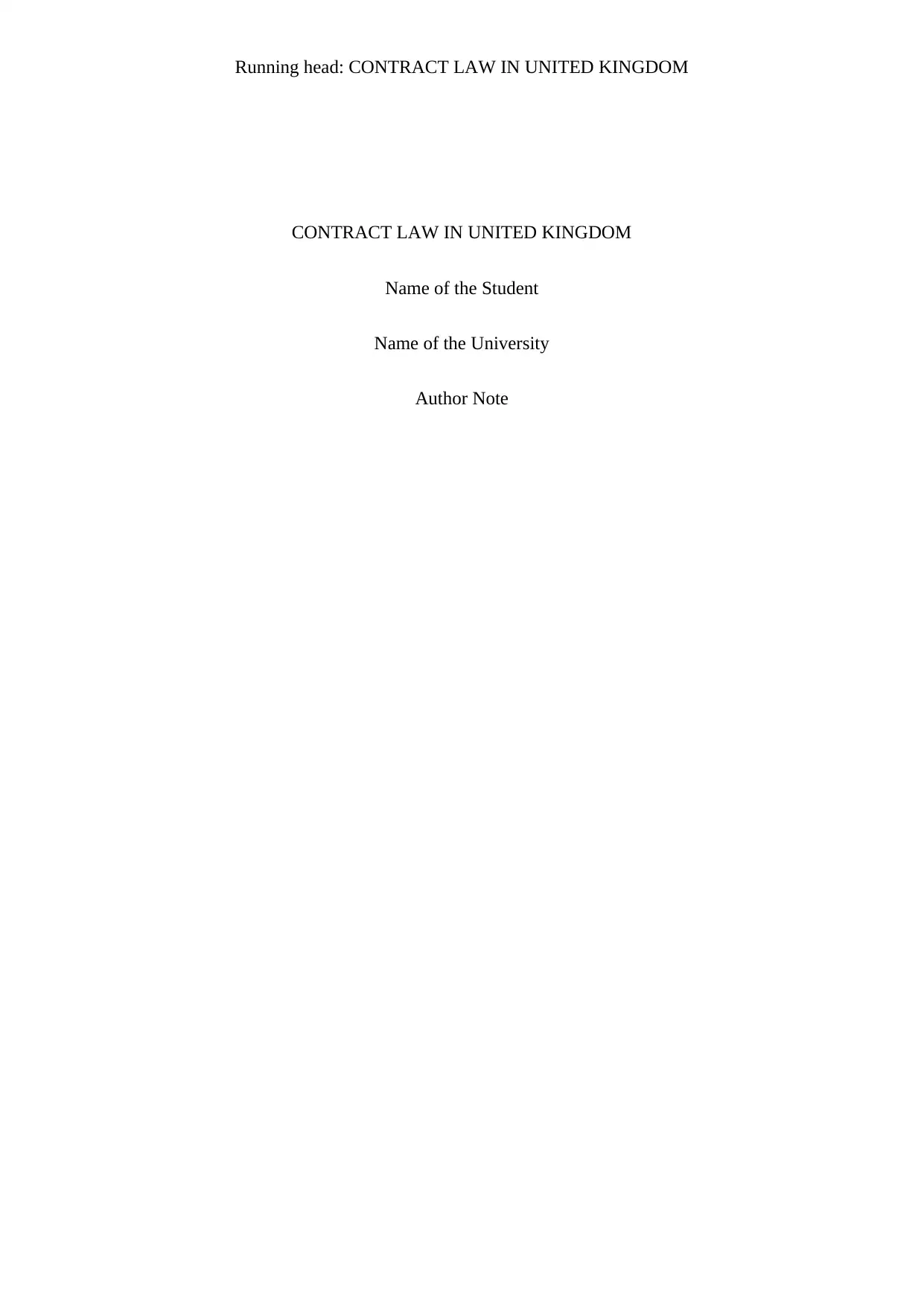
Running head: CONTRACT LAW IN UNITED KINGDOM
CONTRACT LAW IN UNITED KINGDOM
Name of the Student
Name of the University
Author Note
CONTRACT LAW IN UNITED KINGDOM
Name of the Student
Name of the University
Author Note
Paraphrase This Document
Need a fresh take? Get an instant paraphrase of this document with our AI Paraphraser
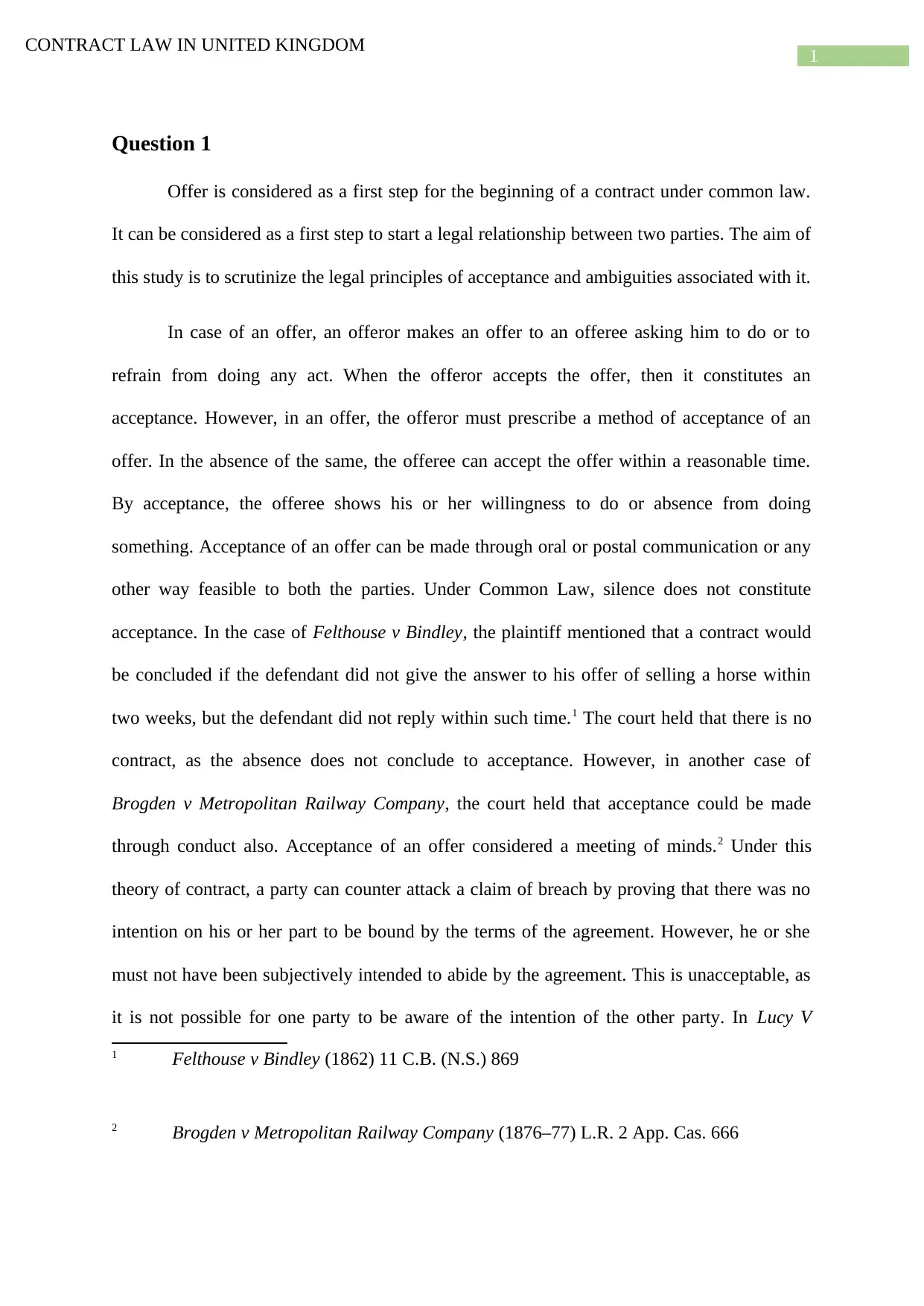
1
CONTRACT LAW IN UNITED KINGDOM
Question 1
Offer is considered as a first step for the beginning of a contract under common law.
It can be considered as a first step to start a legal relationship between two parties. The aim of
this study is to scrutinize the legal principles of acceptance and ambiguities associated with it.
In case of an offer, an offeror makes an offer to an offeree asking him to do or to
refrain from doing any act. When the offeror accepts the offer, then it constitutes an
acceptance. However, in an offer, the offeror must prescribe a method of acceptance of an
offer. In the absence of the same, the offeree can accept the offer within a reasonable time.
By acceptance, the offeree shows his or her willingness to do or absence from doing
something. Acceptance of an offer can be made through oral or postal communication or any
other way feasible to both the parties. Under Common Law, silence does not constitute
acceptance. In the case of Felthouse v Bindley, the plaintiff mentioned that a contract would
be concluded if the defendant did not give the answer to his offer of selling a horse within
two weeks, but the defendant did not reply within such time.1 The court held that there is no
contract, as the absence does not conclude to acceptance. However, in another case of
Brogden v Metropolitan Railway Company, the court held that acceptance could be made
through conduct also. Acceptance of an offer considered a meeting of minds.2 Under this
theory of contract, a party can counter attack a claim of breach by proving that there was no
intention on his or her part to be bound by the terms of the agreement. However, he or she
must not have been subjectively intended to abide by the agreement. This is unacceptable, as
it is not possible for one party to be aware of the intention of the other party. In Lucy V
1 Felthouse v Bindley (1862) 11 C.B. (N.S.) 869
2 Brogden v Metropolitan Railway Company (1876–77) L.R. 2 App. Cas. 666
CONTRACT LAW IN UNITED KINGDOM
Question 1
Offer is considered as a first step for the beginning of a contract under common law.
It can be considered as a first step to start a legal relationship between two parties. The aim of
this study is to scrutinize the legal principles of acceptance and ambiguities associated with it.
In case of an offer, an offeror makes an offer to an offeree asking him to do or to
refrain from doing any act. When the offeror accepts the offer, then it constitutes an
acceptance. However, in an offer, the offeror must prescribe a method of acceptance of an
offer. In the absence of the same, the offeree can accept the offer within a reasonable time.
By acceptance, the offeree shows his or her willingness to do or absence from doing
something. Acceptance of an offer can be made through oral or postal communication or any
other way feasible to both the parties. Under Common Law, silence does not constitute
acceptance. In the case of Felthouse v Bindley, the plaintiff mentioned that a contract would
be concluded if the defendant did not give the answer to his offer of selling a horse within
two weeks, but the defendant did not reply within such time.1 The court held that there is no
contract, as the absence does not conclude to acceptance. However, in another case of
Brogden v Metropolitan Railway Company, the court held that acceptance could be made
through conduct also. Acceptance of an offer considered a meeting of minds.2 Under this
theory of contract, a party can counter attack a claim of breach by proving that there was no
intention on his or her part to be bound by the terms of the agreement. However, he or she
must not have been subjectively intended to abide by the agreement. This is unacceptable, as
it is not possible for one party to be aware of the intention of the other party. In Lucy V
1 Felthouse v Bindley (1862) 11 C.B. (N.S.) 869
2 Brogden v Metropolitan Railway Company (1876–77) L.R. 2 App. Cas. 666
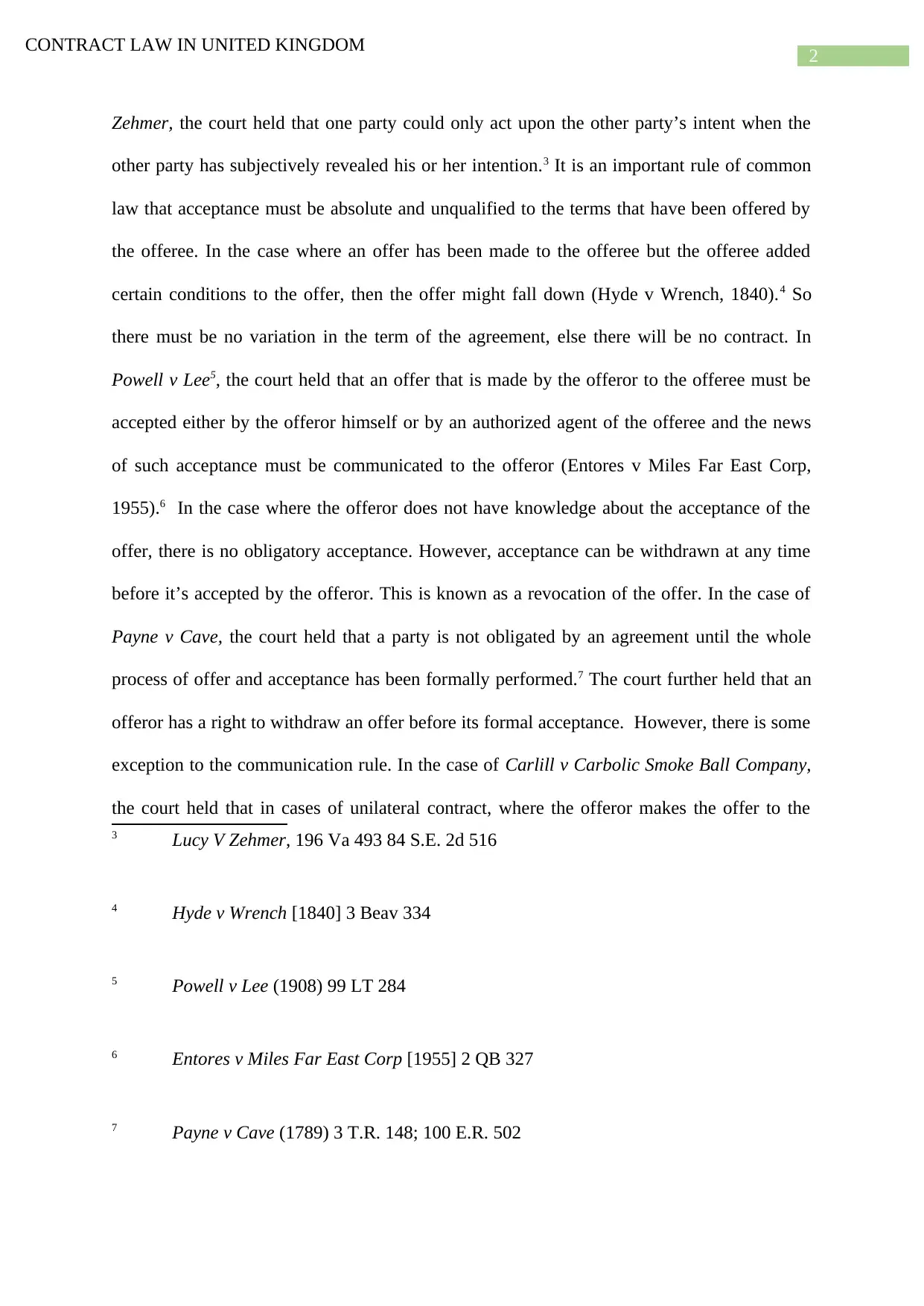
2
CONTRACT LAW IN UNITED KINGDOM
Zehmer, the court held that one party could only act upon the other party’s intent when the
other party has subjectively revealed his or her intention.3 It is an important rule of common
law that acceptance must be absolute and unqualified to the terms that have been offered by
the offeree. In the case where an offer has been made to the offeree but the offeree added
certain conditions to the offer, then the offer might fall down (Hyde v Wrench, 1840).4 So
there must be no variation in the term of the agreement, else there will be no contract. In
Powell v Lee5, the court held that an offer that is made by the offeror to the offeree must be
accepted either by the offeror himself or by an authorized agent of the offeree and the news
of such acceptance must be communicated to the offeror (Entores v Miles Far East Corp,
1955).6 In the case where the offeror does not have knowledge about the acceptance of the
offer, there is no obligatory acceptance. However, acceptance can be withdrawn at any time
before it’s accepted by the offeror. This is known as a revocation of the offer. In the case of
Payne v Cave, the court held that a party is not obligated by an agreement until the whole
process of offer and acceptance has been formally performed.7 The court further held that an
offeror has a right to withdraw an offer before its formal acceptance. However, there is some
exception to the communication rule. In the case of Carlill v Carbolic Smoke Ball Company,
the court held that in cases of unilateral contract, where the offeror makes the offer to the
3 Lucy V Zehmer, 196 Va 493 84 S.E. 2d 516
4 Hyde v Wrench [1840] 3 Beav 334
5 Powell v Lee (1908) 99 LT 284
6 Entores v Miles Far East Corp [1955] 2 QB 327
7 Payne v Cave (1789) 3 T.R. 148; 100 E.R. 502
CONTRACT LAW IN UNITED KINGDOM
Zehmer, the court held that one party could only act upon the other party’s intent when the
other party has subjectively revealed his or her intention.3 It is an important rule of common
law that acceptance must be absolute and unqualified to the terms that have been offered by
the offeree. In the case where an offer has been made to the offeree but the offeree added
certain conditions to the offer, then the offer might fall down (Hyde v Wrench, 1840).4 So
there must be no variation in the term of the agreement, else there will be no contract. In
Powell v Lee5, the court held that an offer that is made by the offeror to the offeree must be
accepted either by the offeror himself or by an authorized agent of the offeree and the news
of such acceptance must be communicated to the offeror (Entores v Miles Far East Corp,
1955).6 In the case where the offeror does not have knowledge about the acceptance of the
offer, there is no obligatory acceptance. However, acceptance can be withdrawn at any time
before it’s accepted by the offeror. This is known as a revocation of the offer. In the case of
Payne v Cave, the court held that a party is not obligated by an agreement until the whole
process of offer and acceptance has been formally performed.7 The court further held that an
offeror has a right to withdraw an offer before its formal acceptance. However, there is some
exception to the communication rule. In the case of Carlill v Carbolic Smoke Ball Company,
the court held that in cases of unilateral contract, where the offeror makes the offer to the
3 Lucy V Zehmer, 196 Va 493 84 S.E. 2d 516
4 Hyde v Wrench [1840] 3 Beav 334
5 Powell v Lee (1908) 99 LT 284
6 Entores v Miles Far East Corp [1955] 2 QB 327
7 Payne v Cave (1789) 3 T.R. 148; 100 E.R. 502
⊘ This is a preview!⊘
Do you want full access?
Subscribe today to unlock all pages.

Trusted by 1+ million students worldwide
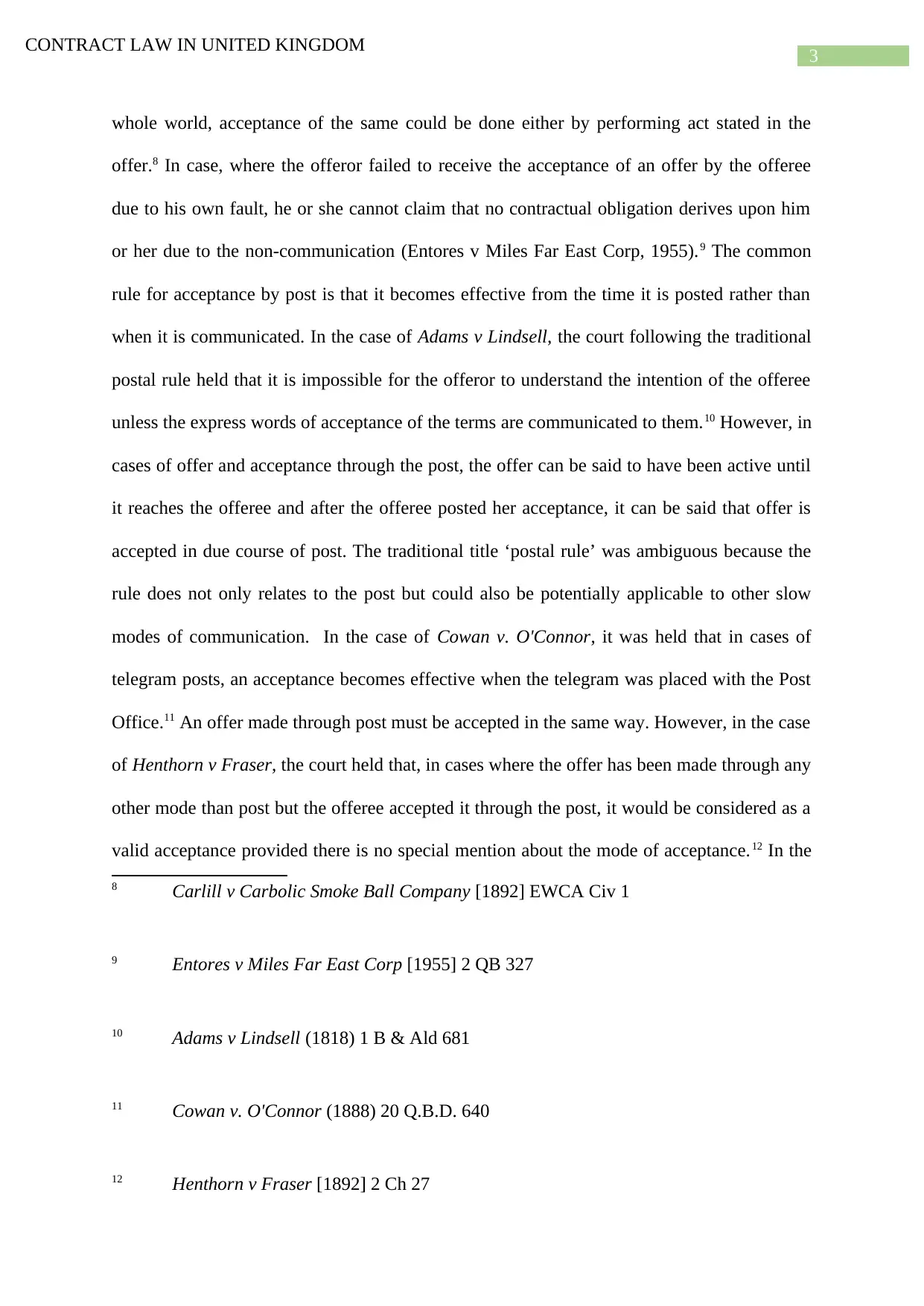
3
CONTRACT LAW IN UNITED KINGDOM
whole world, acceptance of the same could be done either by performing act stated in the
offer.8 In case, where the offeror failed to receive the acceptance of an offer by the offeree
due to his own fault, he or she cannot claim that no contractual obligation derives upon him
or her due to the non-communication (Entores v Miles Far East Corp, 1955).9 The common
rule for acceptance by post is that it becomes effective from the time it is posted rather than
when it is communicated. In the case of Adams v Lindsell, the court following the traditional
postal rule held that it is impossible for the offeror to understand the intention of the offeree
unless the express words of acceptance of the terms are communicated to them.10 However, in
cases of offer and acceptance through the post, the offer can be said to have been active until
it reaches the offeree and after the offeree posted her acceptance, it can be said that offer is
accepted in due course of post. The traditional title ‘postal rule’ was ambiguous because the
rule does not only relates to the post but could also be potentially applicable to other slow
modes of communication. In the case of Cowan v. O'Connor, it was held that in cases of
telegram posts, an acceptance becomes effective when the telegram was placed with the Post
Office.11 An offer made through post must be accepted in the same way. However, in the case
of Henthorn v Fraser, the court held that, in cases where the offer has been made through any
other mode than post but the offeree accepted it through the post, it would be considered as a
valid acceptance provided there is no special mention about the mode of acceptance.12 In the
8 Carlill v Carbolic Smoke Ball Company [1892] EWCA Civ 1
9 Entores v Miles Far East Corp [1955] 2 QB 327
10 Adams v Lindsell (1818) 1 B & Ald 681
11 Cowan v. O'Connor (1888) 20 Q.B.D. 640
12 Henthorn v Fraser [1892] 2 Ch 27
CONTRACT LAW IN UNITED KINGDOM
whole world, acceptance of the same could be done either by performing act stated in the
offer.8 In case, where the offeror failed to receive the acceptance of an offer by the offeree
due to his own fault, he or she cannot claim that no contractual obligation derives upon him
or her due to the non-communication (Entores v Miles Far East Corp, 1955).9 The common
rule for acceptance by post is that it becomes effective from the time it is posted rather than
when it is communicated. In the case of Adams v Lindsell, the court following the traditional
postal rule held that it is impossible for the offeror to understand the intention of the offeree
unless the express words of acceptance of the terms are communicated to them.10 However, in
cases of offer and acceptance through the post, the offer can be said to have been active until
it reaches the offeree and after the offeree posted her acceptance, it can be said that offer is
accepted in due course of post. The traditional title ‘postal rule’ was ambiguous because the
rule does not only relates to the post but could also be potentially applicable to other slow
modes of communication. In the case of Cowan v. O'Connor, it was held that in cases of
telegram posts, an acceptance becomes effective when the telegram was placed with the Post
Office.11 An offer made through post must be accepted in the same way. However, in the case
of Henthorn v Fraser, the court held that, in cases where the offer has been made through any
other mode than post but the offeree accepted it through the post, it would be considered as a
valid acceptance provided there is no special mention about the mode of acceptance.12 In the
8 Carlill v Carbolic Smoke Ball Company [1892] EWCA Civ 1
9 Entores v Miles Far East Corp [1955] 2 QB 327
10 Adams v Lindsell (1818) 1 B & Ald 681
11 Cowan v. O'Connor (1888) 20 Q.B.D. 640
12 Henthorn v Fraser [1892] 2 Ch 27
Paraphrase This Document
Need a fresh take? Get an instant paraphrase of this document with our AI Paraphraser
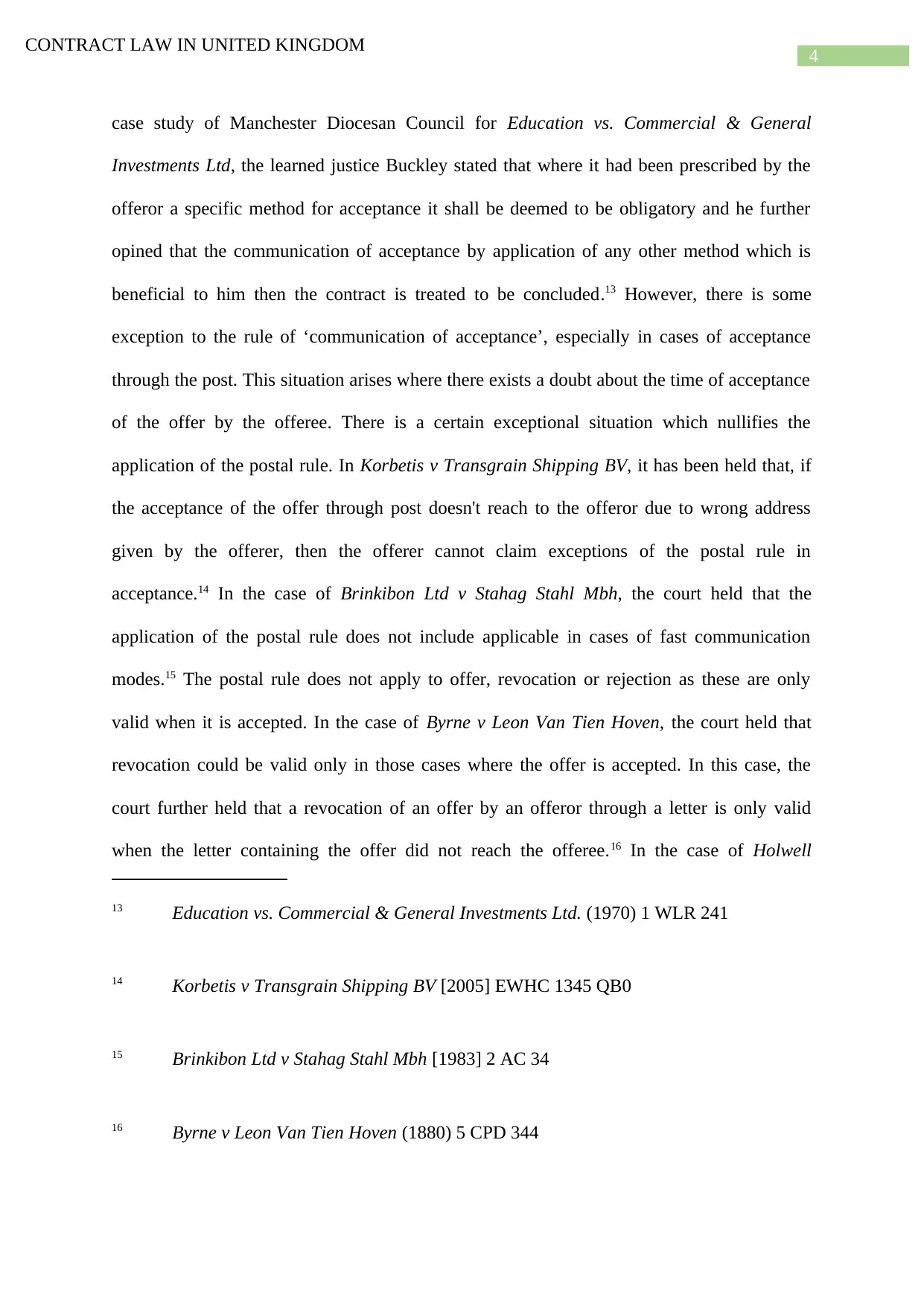
4
CONTRACT LAW IN UNITED KINGDOM
case study of Manchester Diocesan Council for Education vs. Commercial & General
Investments Ltd, the learned justice Buckley stated that where it had been prescribed by the
offeror a specific method for acceptance it shall be deemed to be obligatory and he further
opined that the communication of acceptance by application of any other method which is
beneficial to him then the contract is treated to be concluded.13 However, there is some
exception to the rule of ‘communication of acceptance’, especially in cases of acceptance
through the post. This situation arises where there exists a doubt about the time of acceptance
of the offer by the offeree. There is a certain exceptional situation which nullifies the
application of the postal rule. In Korbetis v Transgrain Shipping BV, it has been held that, if
the acceptance of the offer through post doesn't reach to the offeror due to wrong address
given by the offerer, then the offerer cannot claim exceptions of the postal rule in
acceptance.14 In the case of Brinkibon Ltd v Stahag Stahl Mbh, the court held that the
application of the postal rule does not include applicable in cases of fast communication
modes.15 The postal rule does not apply to offer, revocation or rejection as these are only
valid when it is accepted. In the case of Byrne v Leon Van Tien Hoven, the court held that
revocation could be valid only in those cases where the offer is accepted. In this case, the
court further held that a revocation of an offer by an offeror through a letter is only valid
when the letter containing the offer did not reach the offeree.16 In the case of Holwell
13 Education vs. Commercial & General Investments Ltd. (1970) 1 WLR 241
14 Korbetis v Transgrain Shipping BV [2005] EWHC 1345 QB0
15 Brinkibon Ltd v Stahag Stahl Mbh [1983] 2 AC 34
16 Byrne v Leon Van Tien Hoven (1880) 5 CPD 344
CONTRACT LAW IN UNITED KINGDOM
case study of Manchester Diocesan Council for Education vs. Commercial & General
Investments Ltd, the learned justice Buckley stated that where it had been prescribed by the
offeror a specific method for acceptance it shall be deemed to be obligatory and he further
opined that the communication of acceptance by application of any other method which is
beneficial to him then the contract is treated to be concluded.13 However, there is some
exception to the rule of ‘communication of acceptance’, especially in cases of acceptance
through the post. This situation arises where there exists a doubt about the time of acceptance
of the offer by the offeree. There is a certain exceptional situation which nullifies the
application of the postal rule. In Korbetis v Transgrain Shipping BV, it has been held that, if
the acceptance of the offer through post doesn't reach to the offeror due to wrong address
given by the offerer, then the offerer cannot claim exceptions of the postal rule in
acceptance.14 In the case of Brinkibon Ltd v Stahag Stahl Mbh, the court held that the
application of the postal rule does not include applicable in cases of fast communication
modes.15 The postal rule does not apply to offer, revocation or rejection as these are only
valid when it is accepted. In the case of Byrne v Leon Van Tien Hoven, the court held that
revocation could be valid only in those cases where the offer is accepted. In this case, the
court further held that a revocation of an offer by an offeror through a letter is only valid
when the letter containing the offer did not reach the offeree.16 In the case of Holwell
13 Education vs. Commercial & General Investments Ltd. (1970) 1 WLR 241
14 Korbetis v Transgrain Shipping BV [2005] EWHC 1345 QB0
15 Brinkibon Ltd v Stahag Stahl Mbh [1983] 2 AC 34
16 Byrne v Leon Van Tien Hoven (1880) 5 CPD 344
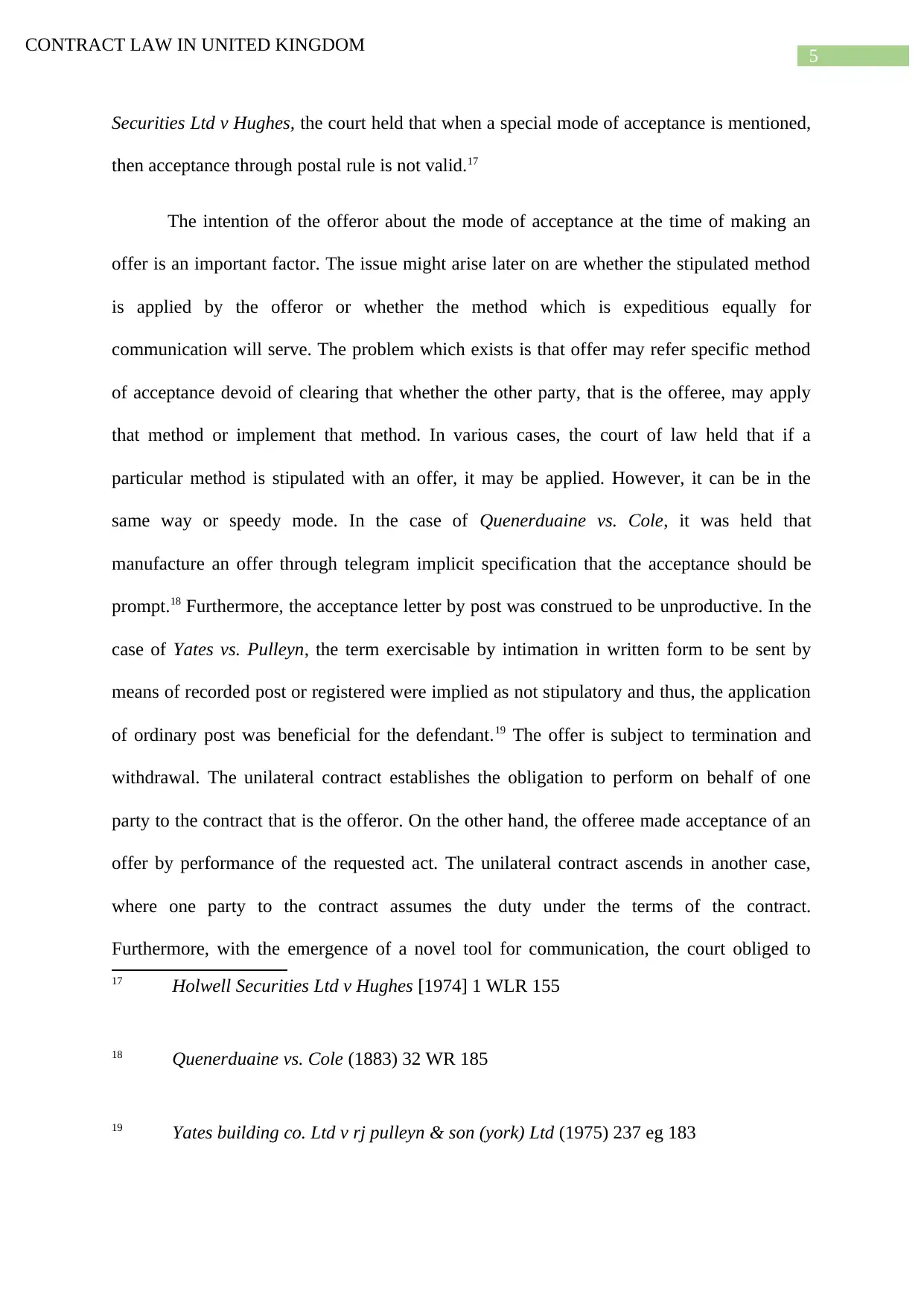
5
CONTRACT LAW IN UNITED KINGDOM
Securities Ltd v Hughes, the court held that when a special mode of acceptance is mentioned,
then acceptance through postal rule is not valid.17
The intention of the offeror about the mode of acceptance at the time of making an
offer is an important factor. The issue might arise later on are whether the stipulated method
is applied by the offeror or whether the method which is expeditious equally for
communication will serve. The problem which exists is that offer may refer specific method
of acceptance devoid of clearing that whether the other party, that is the offeree, may apply
that method or implement that method. In various cases, the court of law held that if a
particular method is stipulated with an offer, it may be applied. However, it can be in the
same way or speedy mode. In the case of Quenerduaine vs. Cole, it was held that
manufacture an offer through telegram implicit specification that the acceptance should be
prompt.18 Furthermore, the acceptance letter by post was construed to be unproductive. In the
case of Yates vs. Pulleyn, the term exercisable by intimation in written form to be sent by
means of recorded post or registered were implied as not stipulatory and thus, the application
of ordinary post was beneficial for the defendant.19 The offer is subject to termination and
withdrawal. The unilateral contract establishes the obligation to perform on behalf of one
party to the contract that is the offeror. On the other hand, the offeree made acceptance of an
offer by performance of the requested act. The unilateral contract ascends in another case,
where one party to the contract assumes the duty under the terms of the contract.
Furthermore, with the emergence of a novel tool for communication, the court obliged to
17 Holwell Securities Ltd v Hughes [1974] 1 WLR 155
18 Quenerduaine vs. Cole (1883) 32 WR 185
19 Yates building co. Ltd v rj pulleyn & son (york) Ltd (1975) 237 eg 183
CONTRACT LAW IN UNITED KINGDOM
Securities Ltd v Hughes, the court held that when a special mode of acceptance is mentioned,
then acceptance through postal rule is not valid.17
The intention of the offeror about the mode of acceptance at the time of making an
offer is an important factor. The issue might arise later on are whether the stipulated method
is applied by the offeror or whether the method which is expeditious equally for
communication will serve. The problem which exists is that offer may refer specific method
of acceptance devoid of clearing that whether the other party, that is the offeree, may apply
that method or implement that method. In various cases, the court of law held that if a
particular method is stipulated with an offer, it may be applied. However, it can be in the
same way or speedy mode. In the case of Quenerduaine vs. Cole, it was held that
manufacture an offer through telegram implicit specification that the acceptance should be
prompt.18 Furthermore, the acceptance letter by post was construed to be unproductive. In the
case of Yates vs. Pulleyn, the term exercisable by intimation in written form to be sent by
means of recorded post or registered were implied as not stipulatory and thus, the application
of ordinary post was beneficial for the defendant.19 The offer is subject to termination and
withdrawal. The unilateral contract establishes the obligation to perform on behalf of one
party to the contract that is the offeror. On the other hand, the offeree made acceptance of an
offer by performance of the requested act. The unilateral contract ascends in another case,
where one party to the contract assumes the duty under the terms of the contract.
Furthermore, with the emergence of a novel tool for communication, the court obliged to
17 Holwell Securities Ltd v Hughes [1974] 1 WLR 155
18 Quenerduaine vs. Cole (1883) 32 WR 185
19 Yates building co. Ltd v rj pulleyn & son (york) Ltd (1975) 237 eg 183
⊘ This is a preview!⊘
Do you want full access?
Subscribe today to unlock all pages.

Trusted by 1+ million students worldwide
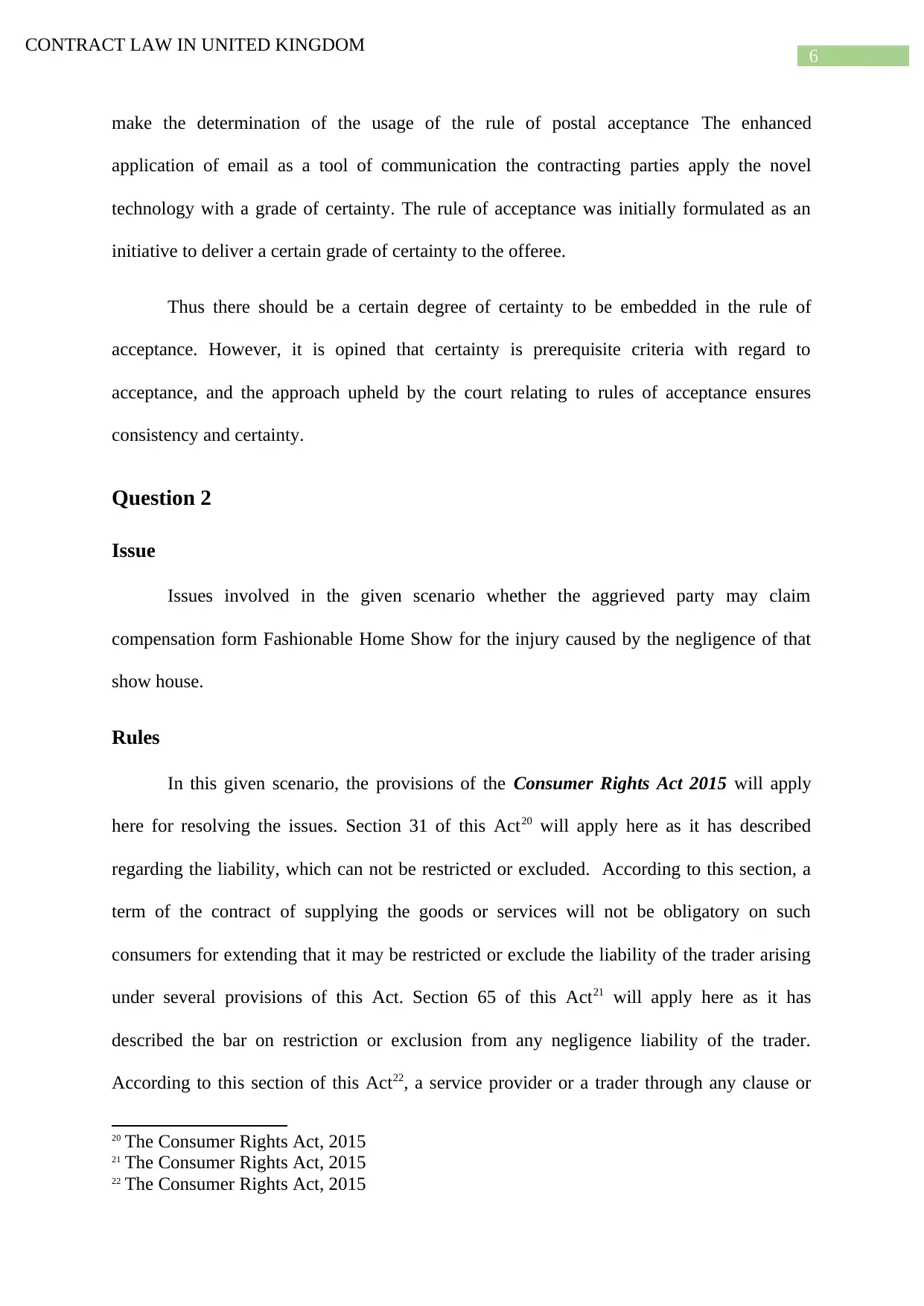
6
CONTRACT LAW IN UNITED KINGDOM
make the determination of the usage of the rule of postal acceptance The enhanced
application of email as a tool of communication the contracting parties apply the novel
technology with a grade of certainty. The rule of acceptance was initially formulated as an
initiative to deliver a certain grade of certainty to the offeree.
Thus there should be a certain degree of certainty to be embedded in the rule of
acceptance. However, it is opined that certainty is prerequisite criteria with regard to
acceptance, and the approach upheld by the court relating to rules of acceptance ensures
consistency and certainty.
Question 2
Issue
Issues involved in the given scenario whether the aggrieved party may claim
compensation form Fashionable Home Show for the injury caused by the negligence of that
show house.
Rules
In this given scenario, the provisions of the Consumer Rights Act 2015 will apply
here for resolving the issues. Section 31 of this Act20 will apply here as it has described
regarding the liability, which can not be restricted or excluded. According to this section, a
term of the contract of supplying the goods or services will not be obligatory on such
consumers for extending that it may be restricted or exclude the liability of the trader arising
under several provisions of this Act. Section 65 of this Act21 will apply here as it has
described the bar on restriction or exclusion from any negligence liability of the trader.
According to this section of this Act22, a service provider or a trader through any clause or
20 The Consumer Rights Act, 2015
21 The Consumer Rights Act, 2015
22 The Consumer Rights Act, 2015
CONTRACT LAW IN UNITED KINGDOM
make the determination of the usage of the rule of postal acceptance The enhanced
application of email as a tool of communication the contracting parties apply the novel
technology with a grade of certainty. The rule of acceptance was initially formulated as an
initiative to deliver a certain grade of certainty to the offeree.
Thus there should be a certain degree of certainty to be embedded in the rule of
acceptance. However, it is opined that certainty is prerequisite criteria with regard to
acceptance, and the approach upheld by the court relating to rules of acceptance ensures
consistency and certainty.
Question 2
Issue
Issues involved in the given scenario whether the aggrieved party may claim
compensation form Fashionable Home Show for the injury caused by the negligence of that
show house.
Rules
In this given scenario, the provisions of the Consumer Rights Act 2015 will apply
here for resolving the issues. Section 31 of this Act20 will apply here as it has described
regarding the liability, which can not be restricted or excluded. According to this section, a
term of the contract of supplying the goods or services will not be obligatory on such
consumers for extending that it may be restricted or exclude the liability of the trader arising
under several provisions of this Act. Section 65 of this Act21 will apply here as it has
described the bar on restriction or exclusion from any negligence liability of the trader.
According to this section of this Act22, a service provider or a trader through any clause or
20 The Consumer Rights Act, 2015
21 The Consumer Rights Act, 2015
22 The Consumer Rights Act, 2015
Paraphrase This Document
Need a fresh take? Get an instant paraphrase of this document with our AI Paraphraser
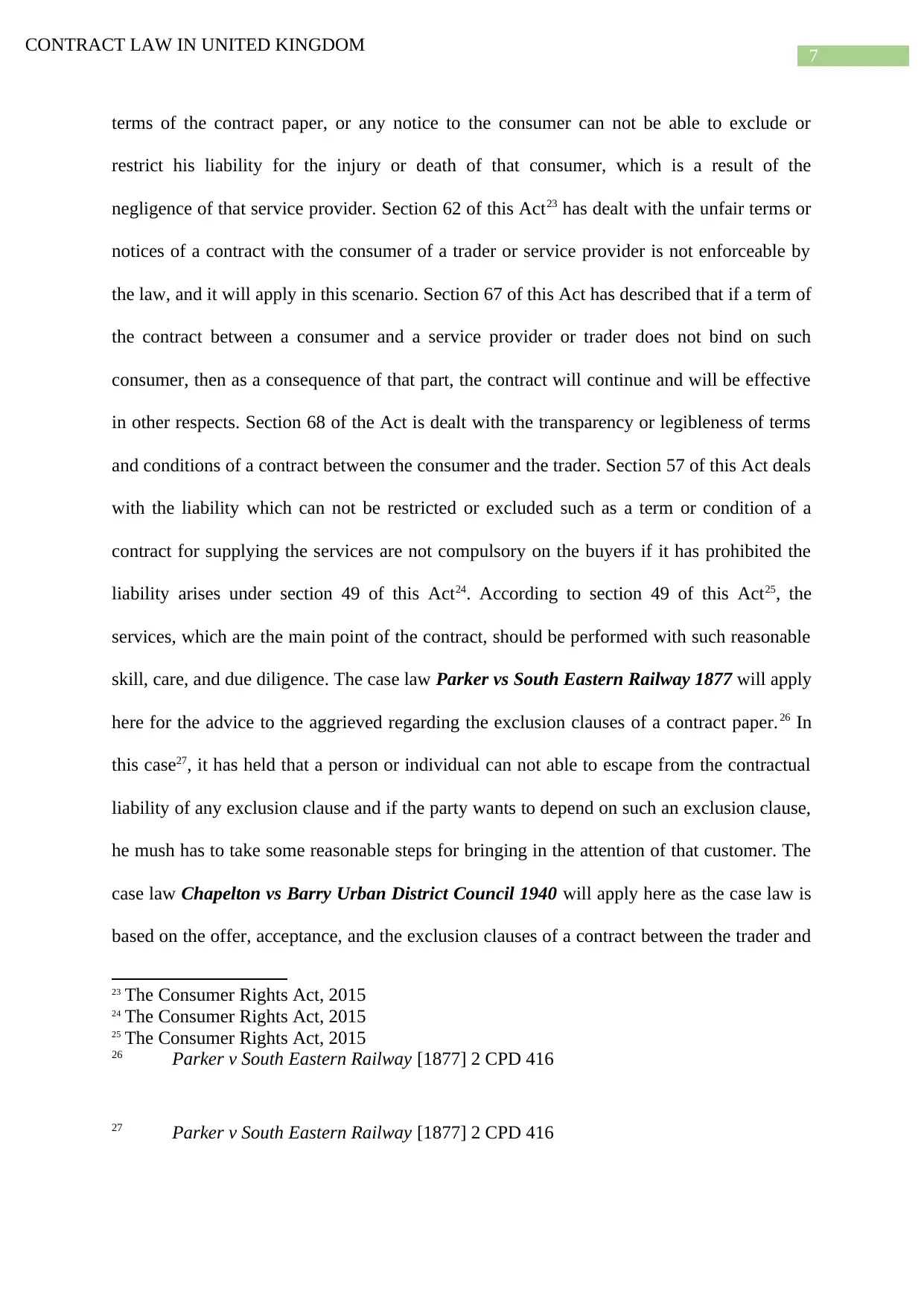
7
CONTRACT LAW IN UNITED KINGDOM
terms of the contract paper, or any notice to the consumer can not be able to exclude or
restrict his liability for the injury or death of that consumer, which is a result of the
negligence of that service provider. Section 62 of this Act23 has dealt with the unfair terms or
notices of a contract with the consumer of a trader or service provider is not enforceable by
the law, and it will apply in this scenario. Section 67 of this Act has described that if a term of
the contract between a consumer and a service provider or trader does not bind on such
consumer, then as a consequence of that part, the contract will continue and will be effective
in other respects. Section 68 of the Act is dealt with the transparency or legibleness of terms
and conditions of a contract between the consumer and the trader. Section 57 of this Act deals
with the liability which can not be restricted or excluded such as a term or condition of a
contract for supplying the services are not compulsory on the buyers if it has prohibited the
liability arises under section 49 of this Act24. According to section 49 of this Act25, the
services, which are the main point of the contract, should be performed with such reasonable
skill, care, and due diligence. The case law Parker vs South Eastern Railway 1877 will apply
here for the advice to the aggrieved regarding the exclusion clauses of a contract paper.26 In
this case27, it has held that a person or individual can not able to escape from the contractual
liability of any exclusion clause and if the party wants to depend on such an exclusion clause,
he mush has to take some reasonable steps for bringing in the attention of that customer. The
case law Chapelton vs Barry Urban District Council 1940 will apply here as the case law is
based on the offer, acceptance, and the exclusion clauses of a contract between the trader and
23 The Consumer Rights Act, 2015
24 The Consumer Rights Act, 2015
25 The Consumer Rights Act, 2015
26 Parker v South Eastern Railway [1877] 2 CPD 416
27 Parker v South Eastern Railway [1877] 2 CPD 416
CONTRACT LAW IN UNITED KINGDOM
terms of the contract paper, or any notice to the consumer can not be able to exclude or
restrict his liability for the injury or death of that consumer, which is a result of the
negligence of that service provider. Section 62 of this Act23 has dealt with the unfair terms or
notices of a contract with the consumer of a trader or service provider is not enforceable by
the law, and it will apply in this scenario. Section 67 of this Act has described that if a term of
the contract between a consumer and a service provider or trader does not bind on such
consumer, then as a consequence of that part, the contract will continue and will be effective
in other respects. Section 68 of the Act is dealt with the transparency or legibleness of terms
and conditions of a contract between the consumer and the trader. Section 57 of this Act deals
with the liability which can not be restricted or excluded such as a term or condition of a
contract for supplying the services are not compulsory on the buyers if it has prohibited the
liability arises under section 49 of this Act24. According to section 49 of this Act25, the
services, which are the main point of the contract, should be performed with such reasonable
skill, care, and due diligence. The case law Parker vs South Eastern Railway 1877 will apply
here for the advice to the aggrieved regarding the exclusion clauses of a contract paper.26 In
this case27, it has held that a person or individual can not able to escape from the contractual
liability of any exclusion clause and if the party wants to depend on such an exclusion clause,
he mush has to take some reasonable steps for bringing in the attention of that customer. The
case law Chapelton vs Barry Urban District Council 1940 will apply here as the case law is
based on the offer, acceptance, and the exclusion clauses of a contract between the trader and
23 The Consumer Rights Act, 2015
24 The Consumer Rights Act, 2015
25 The Consumer Rights Act, 2015
26 Parker v South Eastern Railway [1877] 2 CPD 416
27 Parker v South Eastern Railway [1877] 2 CPD 416
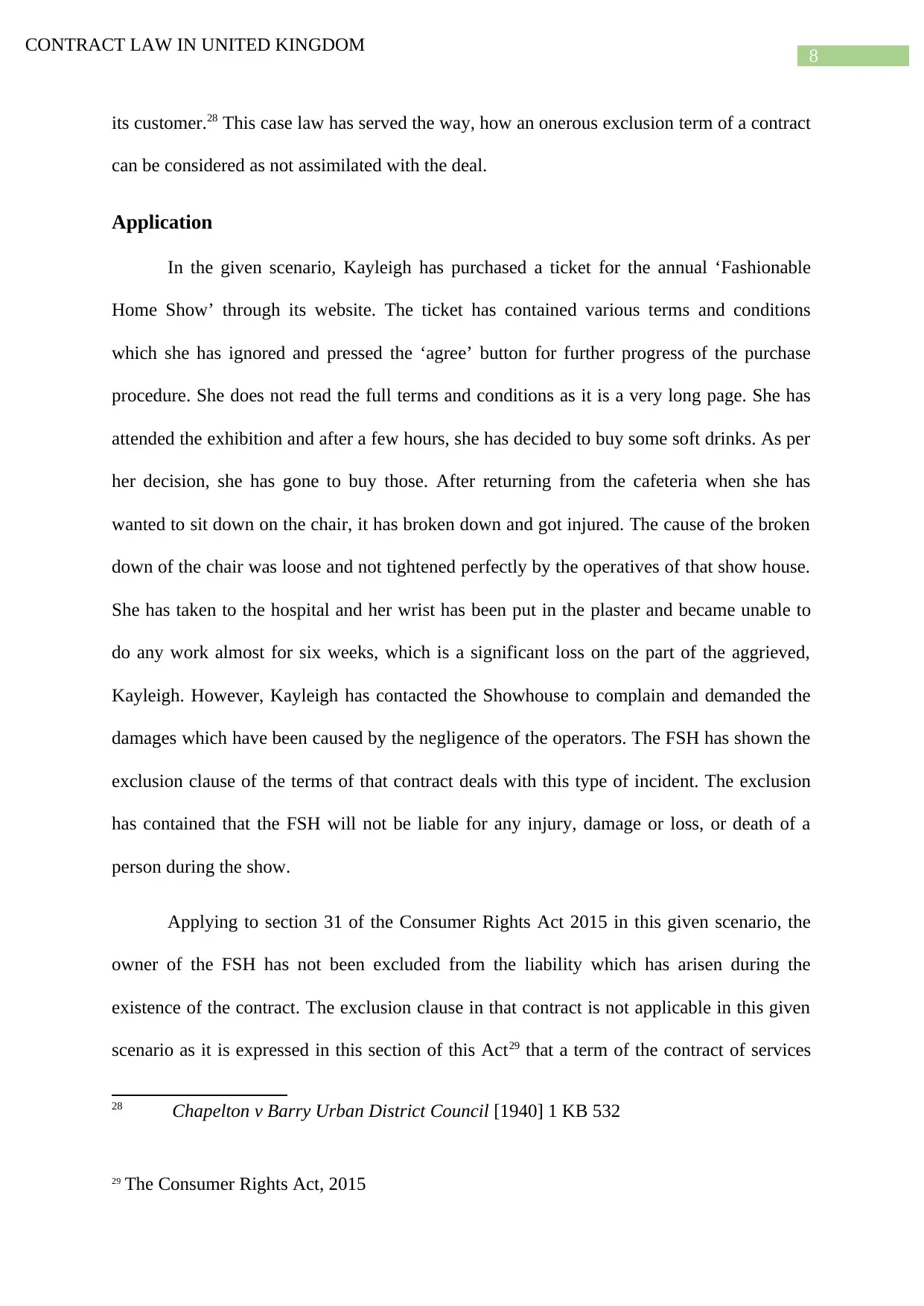
8
CONTRACT LAW IN UNITED KINGDOM
its customer.28 This case law has served the way, how an onerous exclusion term of a contract
can be considered as not assimilated with the deal.
Application
In the given scenario, Kayleigh has purchased a ticket for the annual ‘Fashionable
Home Show’ through its website. The ticket has contained various terms and conditions
which she has ignored and pressed the ‘agree’ button for further progress of the purchase
procedure. She does not read the full terms and conditions as it is a very long page. She has
attended the exhibition and after a few hours, she has decided to buy some soft drinks. As per
her decision, she has gone to buy those. After returning from the cafeteria when she has
wanted to sit down on the chair, it has broken down and got injured. The cause of the broken
down of the chair was loose and not tightened perfectly by the operatives of that show house.
She has taken to the hospital and her wrist has been put in the plaster and became unable to
do any work almost for six weeks, which is a significant loss on the part of the aggrieved,
Kayleigh. However, Kayleigh has contacted the Showhouse to complain and demanded the
damages which have been caused by the negligence of the operators. The FSH has shown the
exclusion clause of the terms of that contract deals with this type of incident. The exclusion
has contained that the FSH will not be liable for any injury, damage or loss, or death of a
person during the show.
Applying to section 31 of the Consumer Rights Act 2015 in this given scenario, the
owner of the FSH has not been excluded from the liability which has arisen during the
existence of the contract. The exclusion clause in that contract is not applicable in this given
scenario as it is expressed in this section of this Act29 that a term of the contract of services
28 Chapelton v Barry Urban District Council [1940] 1 KB 532
29 The Consumer Rights Act, 2015
CONTRACT LAW IN UNITED KINGDOM
its customer.28 This case law has served the way, how an onerous exclusion term of a contract
can be considered as not assimilated with the deal.
Application
In the given scenario, Kayleigh has purchased a ticket for the annual ‘Fashionable
Home Show’ through its website. The ticket has contained various terms and conditions
which she has ignored and pressed the ‘agree’ button for further progress of the purchase
procedure. She does not read the full terms and conditions as it is a very long page. She has
attended the exhibition and after a few hours, she has decided to buy some soft drinks. As per
her decision, she has gone to buy those. After returning from the cafeteria when she has
wanted to sit down on the chair, it has broken down and got injured. The cause of the broken
down of the chair was loose and not tightened perfectly by the operatives of that show house.
She has taken to the hospital and her wrist has been put in the plaster and became unable to
do any work almost for six weeks, which is a significant loss on the part of the aggrieved,
Kayleigh. However, Kayleigh has contacted the Showhouse to complain and demanded the
damages which have been caused by the negligence of the operators. The FSH has shown the
exclusion clause of the terms of that contract deals with this type of incident. The exclusion
has contained that the FSH will not be liable for any injury, damage or loss, or death of a
person during the show.
Applying to section 31 of the Consumer Rights Act 2015 in this given scenario, the
owner of the FSH has not been excluded from the liability which has arisen during the
existence of the contract. The exclusion clause in that contract is not applicable in this given
scenario as it is expressed in this section of this Act29 that a term of the contract of services
28 Chapelton v Barry Urban District Council [1940] 1 KB 532
29 The Consumer Rights Act, 2015
⊘ This is a preview!⊘
Do you want full access?
Subscribe today to unlock all pages.

Trusted by 1+ million students worldwide
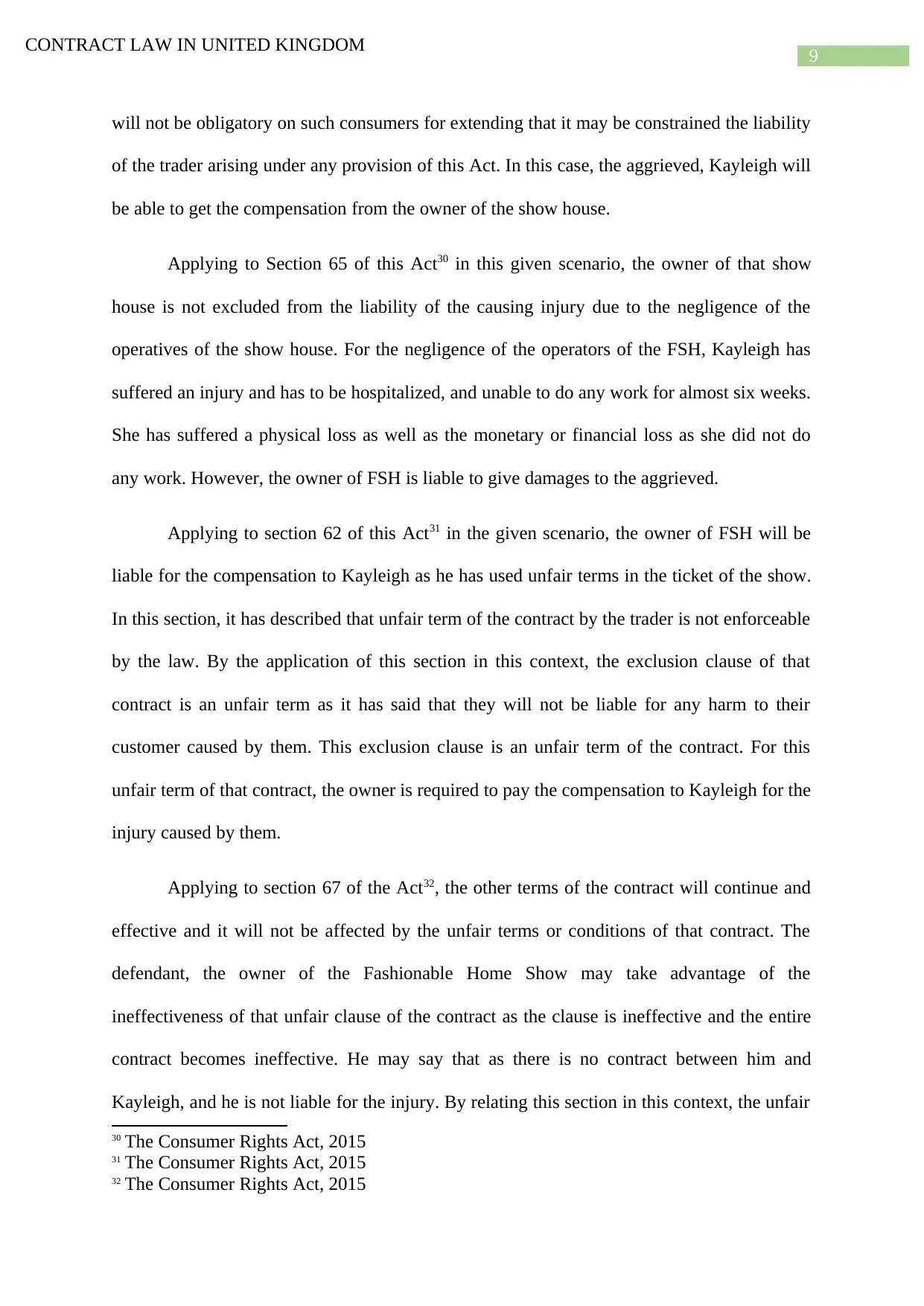
9
CONTRACT LAW IN UNITED KINGDOM
will not be obligatory on such consumers for extending that it may be constrained the liability
of the trader arising under any provision of this Act. In this case, the aggrieved, Kayleigh will
be able to get the compensation from the owner of the show house.
Applying to Section 65 of this Act30 in this given scenario, the owner of that show
house is not excluded from the liability of the causing injury due to the negligence of the
operatives of the show house. For the negligence of the operators of the FSH, Kayleigh has
suffered an injury and has to be hospitalized, and unable to do any work for almost six weeks.
She has suffered a physical loss as well as the monetary or financial loss as she did not do
any work. However, the owner of FSH is liable to give damages to the aggrieved.
Applying to section 62 of this Act31 in the given scenario, the owner of FSH will be
liable for the compensation to Kayleigh as he has used unfair terms in the ticket of the show.
In this section, it has described that unfair term of the contract by the trader is not enforceable
by the law. By the application of this section in this context, the exclusion clause of that
contract is an unfair term as it has said that they will not be liable for any harm to their
customer caused by them. This exclusion clause is an unfair term of the contract. For this
unfair term of that contract, the owner is required to pay the compensation to Kayleigh for the
injury caused by them.
Applying to section 67 of the Act32, the other terms of the contract will continue and
effective and it will not be affected by the unfair terms or conditions of that contract. The
defendant, the owner of the Fashionable Home Show may take advantage of the
ineffectiveness of that unfair clause of the contract as the clause is ineffective and the entire
contract becomes ineffective. He may say that as there is no contract between him and
Kayleigh, and he is not liable for the injury. By relating this section in this context, the unfair
30 The Consumer Rights Act, 2015
31 The Consumer Rights Act, 2015
32 The Consumer Rights Act, 2015
CONTRACT LAW IN UNITED KINGDOM
will not be obligatory on such consumers for extending that it may be constrained the liability
of the trader arising under any provision of this Act. In this case, the aggrieved, Kayleigh will
be able to get the compensation from the owner of the show house.
Applying to Section 65 of this Act30 in this given scenario, the owner of that show
house is not excluded from the liability of the causing injury due to the negligence of the
operatives of the show house. For the negligence of the operators of the FSH, Kayleigh has
suffered an injury and has to be hospitalized, and unable to do any work for almost six weeks.
She has suffered a physical loss as well as the monetary or financial loss as she did not do
any work. However, the owner of FSH is liable to give damages to the aggrieved.
Applying to section 62 of this Act31 in the given scenario, the owner of FSH will be
liable for the compensation to Kayleigh as he has used unfair terms in the ticket of the show.
In this section, it has described that unfair term of the contract by the trader is not enforceable
by the law. By the application of this section in this context, the exclusion clause of that
contract is an unfair term as it has said that they will not be liable for any harm to their
customer caused by them. This exclusion clause is an unfair term of the contract. For this
unfair term of that contract, the owner is required to pay the compensation to Kayleigh for the
injury caused by them.
Applying to section 67 of the Act32, the other terms of the contract will continue and
effective and it will not be affected by the unfair terms or conditions of that contract. The
defendant, the owner of the Fashionable Home Show may take advantage of the
ineffectiveness of that unfair clause of the contract as the clause is ineffective and the entire
contract becomes ineffective. He may say that as there is no contract between him and
Kayleigh, and he is not liable for the injury. By relating this section in this context, the unfair
30 The Consumer Rights Act, 2015
31 The Consumer Rights Act, 2015
32 The Consumer Rights Act, 2015
Paraphrase This Document
Need a fresh take? Get an instant paraphrase of this document with our AI Paraphraser
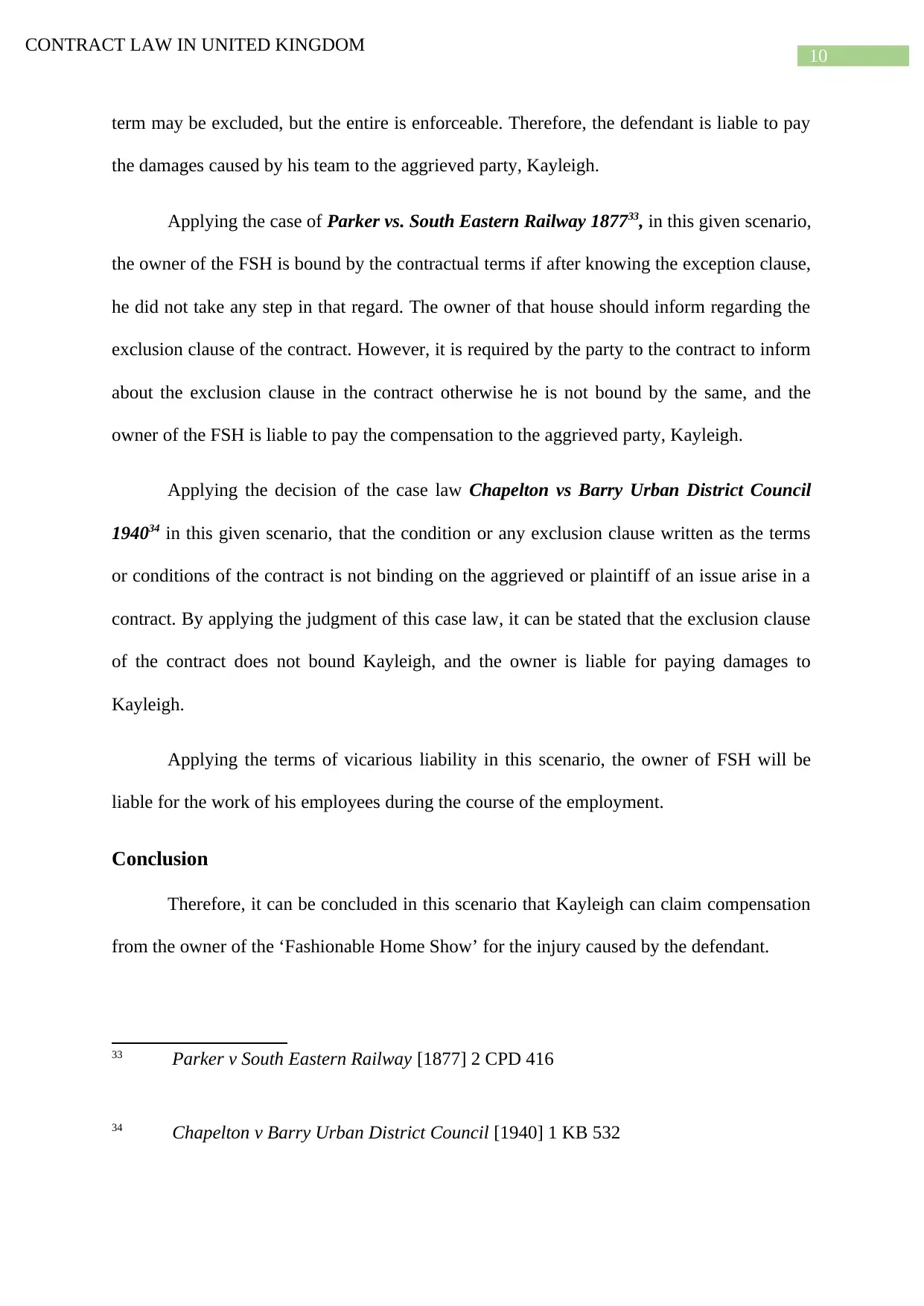
10
CONTRACT LAW IN UNITED KINGDOM
term may be excluded, but the entire is enforceable. Therefore, the defendant is liable to pay
the damages caused by his team to the aggrieved party, Kayleigh.
Applying the case of Parker vs. South Eastern Railway 187733, in this given scenario,
the owner of the FSH is bound by the contractual terms if after knowing the exception clause,
he did not take any step in that regard. The owner of that house should inform regarding the
exclusion clause of the contract. However, it is required by the party to the contract to inform
about the exclusion clause in the contract otherwise he is not bound by the same, and the
owner of the FSH is liable to pay the compensation to the aggrieved party, Kayleigh.
Applying the decision of the case law Chapelton vs Barry Urban District Council
194034 in this given scenario, that the condition or any exclusion clause written as the terms
or conditions of the contract is not binding on the aggrieved or plaintiff of an issue arise in a
contract. By applying the judgment of this case law, it can be stated that the exclusion clause
of the contract does not bound Kayleigh, and the owner is liable for paying damages to
Kayleigh.
Applying the terms of vicarious liability in this scenario, the owner of FSH will be
liable for the work of his employees during the course of the employment.
Conclusion
Therefore, it can be concluded in this scenario that Kayleigh can claim compensation
from the owner of the ‘Fashionable Home Show’ for the injury caused by the defendant.
33 Parker v South Eastern Railway [1877] 2 CPD 416
34 Chapelton v Barry Urban District Council [1940] 1 KB 532
CONTRACT LAW IN UNITED KINGDOM
term may be excluded, but the entire is enforceable. Therefore, the defendant is liable to pay
the damages caused by his team to the aggrieved party, Kayleigh.
Applying the case of Parker vs. South Eastern Railway 187733, in this given scenario,
the owner of the FSH is bound by the contractual terms if after knowing the exception clause,
he did not take any step in that regard. The owner of that house should inform regarding the
exclusion clause of the contract. However, it is required by the party to the contract to inform
about the exclusion clause in the contract otherwise he is not bound by the same, and the
owner of the FSH is liable to pay the compensation to the aggrieved party, Kayleigh.
Applying the decision of the case law Chapelton vs Barry Urban District Council
194034 in this given scenario, that the condition or any exclusion clause written as the terms
or conditions of the contract is not binding on the aggrieved or plaintiff of an issue arise in a
contract. By applying the judgment of this case law, it can be stated that the exclusion clause
of the contract does not bound Kayleigh, and the owner is liable for paying damages to
Kayleigh.
Applying the terms of vicarious liability in this scenario, the owner of FSH will be
liable for the work of his employees during the course of the employment.
Conclusion
Therefore, it can be concluded in this scenario that Kayleigh can claim compensation
from the owner of the ‘Fashionable Home Show’ for the injury caused by the defendant.
33 Parker v South Eastern Railway [1877] 2 CPD 416
34 Chapelton v Barry Urban District Council [1940] 1 KB 532
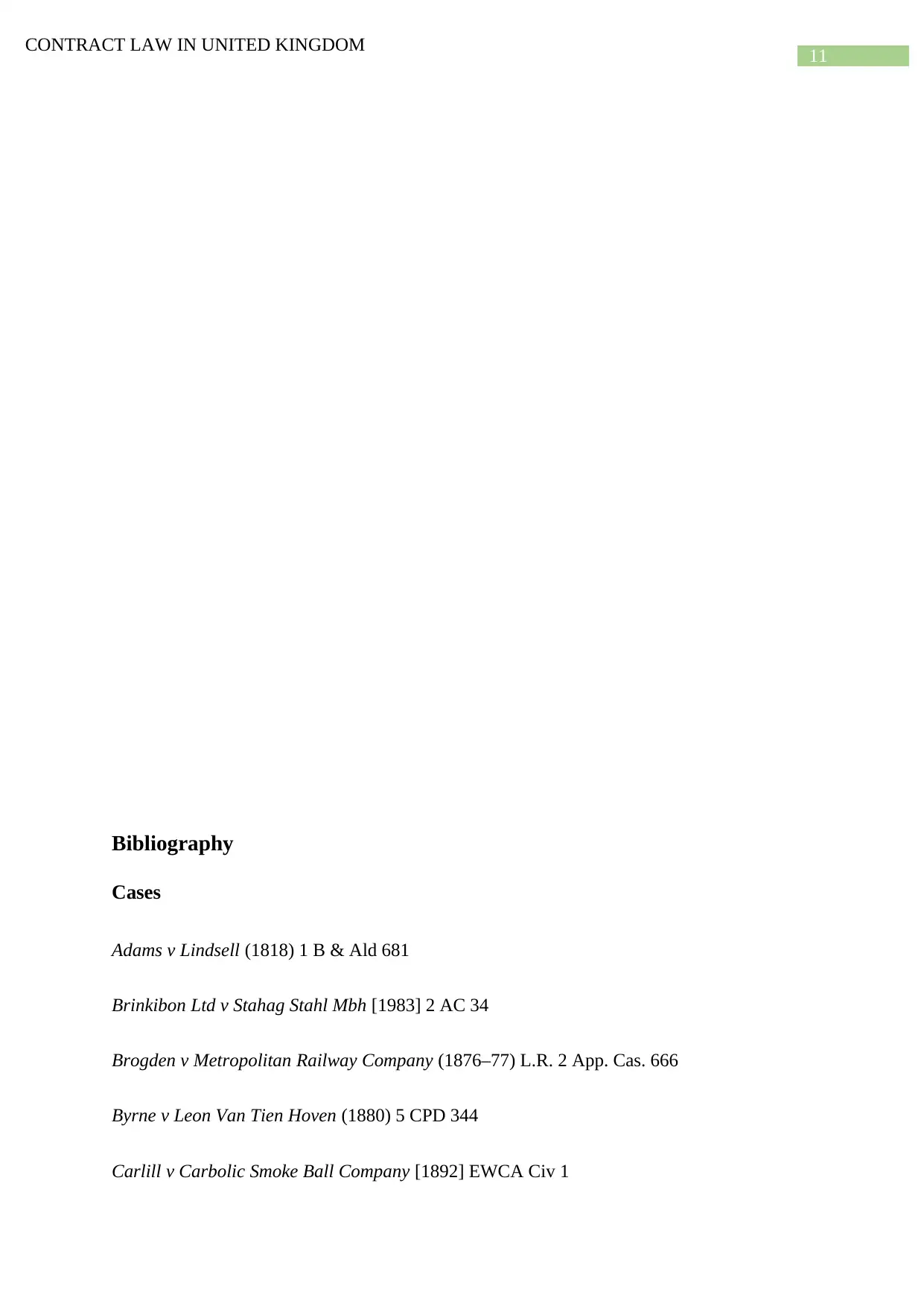
11
CONTRACT LAW IN UNITED KINGDOM
Bibliography
Cases
Adams v Lindsell (1818) 1 B & Ald 681
Brinkibon Ltd v Stahag Stahl Mbh [1983] 2 AC 34
Brogden v Metropolitan Railway Company (1876–77) L.R. 2 App. Cas. 666
Byrne v Leon Van Tien Hoven (1880) 5 CPD 344
Carlill v Carbolic Smoke Ball Company [1892] EWCA Civ 1
CONTRACT LAW IN UNITED KINGDOM
Bibliography
Cases
Adams v Lindsell (1818) 1 B & Ald 681
Brinkibon Ltd v Stahag Stahl Mbh [1983] 2 AC 34
Brogden v Metropolitan Railway Company (1876–77) L.R. 2 App. Cas. 666
Byrne v Leon Van Tien Hoven (1880) 5 CPD 344
Carlill v Carbolic Smoke Ball Company [1892] EWCA Civ 1
⊘ This is a preview!⊘
Do you want full access?
Subscribe today to unlock all pages.

Trusted by 1+ million students worldwide
1 out of 13
Related Documents
Your All-in-One AI-Powered Toolkit for Academic Success.
+13062052269
info@desklib.com
Available 24*7 on WhatsApp / Email
![[object Object]](/_next/static/media/star-bottom.7253800d.svg)
Unlock your academic potential
Copyright © 2020–2026 A2Z Services. All Rights Reserved. Developed and managed by ZUCOL.





